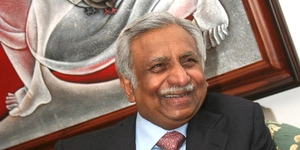Union Finance Minister Nirmala Sitharaman's first budget in 'Amrit Kaal', as a foundation and blueprint drawn for India's next 25 years of development, has not been able to enthuse the healthcare, pharma and medical devices industry.
The budget allotted ₹89,160 crore for the healthcare sector for FY2024, less than 3% increase from the previous year's ₹86,606 crore allocation. In FY23, spending on healthcare was only 2.1% of the GDP, despite the pandemic.
"Overall, the budget aims at increasing spending on the sector, improving universal health coverage, promoting R&D, and increasing skilled manpower, which is a positive. That said, continuing modest allocation towards the healthcare sector leaves India’s healthcare spend as a percentage of GDP well below the world average and other developing and developed nations," says Shamsher Dewan, Senior Vice President & Group Head - Corporate Ratings, ICRA, a rating agency.
In her fifth budget, the FM announced to set up one hundred and fifty-seven new nursing colleges in co-location with the existing 157 medical colleges established since 2014. According to 2019 data from the Ministry of Health and Family Welfare, India had only 1.7 nurses for every thousand people as compared to the three nurses per thousand people requirement.
"We expected the budget to increase healthcare expenditure from 1.5% to 2% - 2.5% with a dedicated focus towards primary and secondary care. While 157 medical colleges have been established since 2014, we still have far fewer doctors than we need and the country needs significant reforms in improving the accessibility and availability of medical education," says Sandhya J, Group Chief Financial Officer (CFO), Narayana Health.
Another announcement is to have a mission to eliminate Sickle Cell Anaemia by 2047 with awareness creation, universal screening of 7 crore people in the age group of 0-40 years in affected tribal areas, and counselling through collaborative efforts of central ministries and state governments.
"The budgeted increase in healthcare expenditure does not seem to be enough to tide over the current challenges of upgradation of infrastructure and providing accessibility and affordability for quality healthcare in the country. It would have been better if there were tax exemptions for healthcare, which is vital to reduce healthcare expenses & out of pocket spending,” says Gautam Khanna, CEO P.D. Hinduja Hospital & Chairman FICCI Health Services.
For the pharma industry, the FM said facilities in select ICMR labs will be made available for research by public and private medical college faculty and private sector R&D teams for encouraging collaborative research and innovation. A new programme to promote research and innovation in pharmaceuticals will be taken up through centres of excellence. "We shall also encourage industry to invest in research and development in specific priority areas said the Finance Minister. Dedicated multidisciplinary courses for medical devices will be supported in existing institutions to ensure the availability of skilled manpower for futuristic medical technologies, high-end manufacturing and research.
"The focus on research and innovation as these factors are essential in driving value-added growth and a robust research ecosystem will help in achieving universal health coverage by enabling accessibility, and availability of life-saving medicines", says Amitabh Dube, Country President and Managing Director, Novartis India.
While the industry welcomes announcements for research & development, skill development, awareness, infrastructure and preventive healthcare, they did not get any big-ticket policy push for the sector.
"The budget is disappointing for the medical devices industry as no measures were taken to end 80-85% import dependence for medical devices to the tune of ₹63,200 crore," says Rajiv Nath, Managing Director of Hindustan Syringes & Medicl Devices and Forum Coordinator at the Association of Indian Medical Device Industry (AIMED).
The industry was expecting measures like a separate Department of Medical Devices, a graded increase of customs duty to 10-15% from the current zero to 7.5%, and trade margin monitoring to prevent consumers from being charged a high MRP of 10 to 20 times import landed prices for medical devices etc.
"A well-designed training course to bridge the current skill gap can upskill the clinical community in using contemporary medical devices and will also help individuals develop the skills necessary for a career in the medical device industry," says Manikandan Bala, MD India & SA, Elekta, a Swedish medical devices company.
The pharma sector was expecting measures like R&D-focused incentives for the promotion of investment, Research Linked incentive schemes for companies making investments to undertake research for new drugs, new chemical and biological drugs, and issuance of innovation bonds similar to the existing NHAI and REC bonds, which enjoy tax-free status and providing long pending clarification on the patent box regime to encourage Indian innovators who developed patents in India. The pharma industry was also expecting tax exemption for goods used for R&D in the pharmaceutical sector and the biotechnology sector should also be extended beyond 31 March 2023.
"Focus on R&D via public-private partnerships and benefits to industry are in line with the industry expectations and will help the country in its positioning as an innovation hub," says Shuchi Ray, Partner, Deloitte India.
Industry experts say strengthening of storage, distribution and logistics needed for endeavours such as a mass vaccination campaign seemed to be barely addressed in the budget.
"Inclusivity (one of the core principles of the budget) and mass availability of healthcare and medicine could also have been addressed by bringing more clarity to the existing regulations on e-pharmacies and enabling more private and foreign investment in e-pharmacies and distribution and logistics enterprises in the healthcare and pharma sector," says Kartik Ganapathy, partner, IndusLaw, a law firm. Amit Singhania, Partner, Shardul Amarchand Mangaldas & Co says the budget has provided the required impetus for credit growth and R&D in the pharma sector.
Similarly, they note that despite the push given for Ayurveda and yoga in recent years by the Government, this budget is silent on both sectors.










Leave a Comment
Your email address will not be published. Required field are marked*